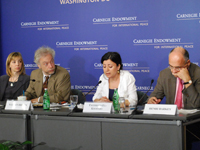Registration
You will receive an email confirming your registration.
Israel’s raid on a flotilla of humanitarian aid ships bound for Gaza, which reportedly left at least nine people dead, drew condemnation from international leaders and leaves prospects for Israeli-Palestinian talks even more dismal. Given these developments, what will President Mahmoud Abbas be looking for when he meets with President Obama on June 9? Is resolving the divide between the West Bank and Gaza required before the peace process can move forward?
Carnegie experts assessed the latest developments and what they will mean for Abbas’s visit to Washington. Taghreed El-Khodary, longtime New York Times correspondent in Gaza, described the situation in Gaza. Michele Dunne outlined a new direction for U.S. policy based on her forthcoming Carnegie paper, which was released at the event. Henri J. Barkey looked at the implications for Turkey’s relations with Israel and the United States. Nathan J. Brown commented and moderated the discussion.
Gaza:
- The Israeli blockade of Gaza has not only devastated the Palestinian economy, but also has severely weakened Gazan education and health infrastructures.
- Before any peace process can move forward, Israel and the United States must accept the political reality that Hamas plays a critical role in Palestinian politics and is not leaving Gaza. By refusing to recognize this situation, the West risks widening the chasm between the West Bank and Gaza as economic development continues in the former and stagnates in the latter.
U.S. Policy
- Two decades of U.S. policy that places the advancement of the peace process ahead of building Palestinian institutions has contributed to weakness within the Palestinian leadership and division between the West Bank and Gaza.
- While the United States should not directly engage Hamas, it should not discourage Fatah and President Abbas from reconciliation talks. Only a unified Palestinian bloc will enjoy enough support to make difficult choices in negotiations.
Turkey:
- Turkey is using its strategic location, economic prowess, historical and cultural ties in the region, and its unstated view that the United States is increasingly weak in the region to promote itself as an important regional and international power. Its current contretemps with the Israelis over the flotilla incident and its engagement with Iran only enhance Turkey’s clout in the Middle East. But it is the Iranian nuclear issue, and Israeli’s perception that Turkey is allying itself with Iran, that is the root cause of the growing hostility between the two countries.
